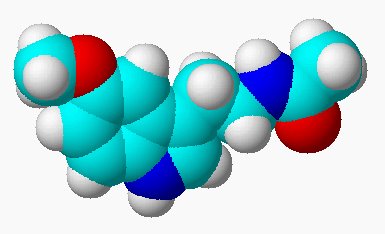Into the Eye of the Tunnel
The effects of low light are real, both physically and psycologically. A lack of light stimulates the production of melatonin (C13 H16 N2 O2), a versatile hormone that regulates your sleep cycle, but it also appears to have benefits as an anti-oxidant, and perhaps helps with immunity. However, melatonin is a close biochemical cousin to seratonin, which has strong effects on mood. Evidence suggests that high melatonin can be linked to depression and seasonal affective disorder (SAD).

3-D image of melatonin (Wikipedia.com)
So how does it feel to have your blood and brain dowsed with heavy loads of melatonin? I find that it tells me to shut down. I crave sleep, especially in the morning when it takes hours to "wake up." You have that feeling of having just gotten out of bed, but it lasts until sunrise some four or five hours later. And by mid-afternoon you're ready for a nap. Forget about staying up late for a movie! Besides, who needs movies when your dreams are vivid, memorable, and bizzare, often playing out in what seems like real time. Melatonin also affects your appetite. You want to eat a lot, especially starches and fats. I also seem to want a little wine (eh, make it a lot!)with every dinner, instead of just a couple times a week.
Let nature take its course and I'd just want to sit around the house, doing not much of anything but watching every variety of CSI episode ever made, drinking wine or liquor, and eating unhealthy quantities of artery-clogging food.
Tomorrow: Fighting back! How we cope with low light and its effects.


0 Comments:
Post a Comment
Subscribe to Post Comments [Atom]
<< Home